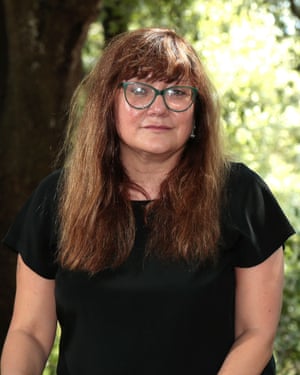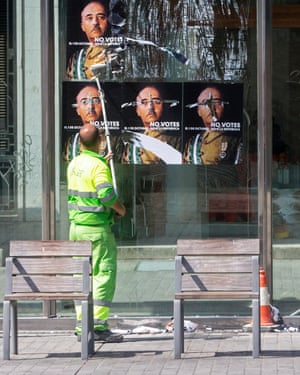‘I’m no fascist’: film-maker hits back over opposition to Catalan independence | World news
She is one of Spain’s leading film-makers, revered in her native Catalonia and admired globally for award-winning films such as My Life Without Me and The Secret Life of Words.

But now director Isabel Coixet finds herself at the centre of a storm of controversy among Catalans after she joined a growing list of prominent cultural figures who plan to oppose a forthcoming independence referendum. This weekend she has risked adding to the furore, telling the Observer that Catalans are afraid of speaking out “for fear of being called fascistsâ€.
She views the referendum process as unnecessary and divisive, and has decided to speak up for those who feel “silenced and eliminated from public discourse†because they don’t support it.
Her comments follow an opinion piece published in El PaÃs newspaper last week in which she said: “Not being an independentista doesn’t make you a fascist. It simply means that we think feeling Catalan and Spanish are not antagonistic concepts.â€
Pro-independence campaigners have recently put up posters depicting the former dictator Francisco Franco with a slogan that implies that anyone who doesn’t vote yes is a fascist.
“People are afraid to speak,†Coixet said. “People say to me, ‘Thank you for speaking out, because I’m too afraid’. I don’t think a referendum is the best way to know what’s happening in the country. Look at Brexit: I don’t think people really knew what they were voting for. And what the government is saying is, if 51% vote yes, OK, now we’re independent.â€
The Catalan government has not said what level of participation or what sort of majority is required for the vote on 1 October to be considered valid.
Coixet complains that the debate about national identity has drowned out all other issues. “I’m still waiting for someone to tell me what the new Catalan republic is going to be like,†she says. “Frankly, I find it hard to tell the difference between a rightwing centralist party and another one that is Catalan nationalist.â€
As was the 2014 referendum, the proposed October vote is opposed by the Spanish government and the result will not be legally binding. “It is going to be like the last one â€" completely irrelevant,†Coixet says. The Catalan government argues that it will be binding because, through a series of steps taken by the regional parliament to “disconnect†the region from the rest of Spain, it will no longer be governed by Madrid. In short, independence legislation has already been prepared, pending a yes vote.
In 2014, 80% of voters backed independence but only 2.3 million of the 5.4 million eligible to cast a ballot bothered to take part and most expect a similar outcome in October if the referendum goes ahead, with only the pro faction turning out in numbers.
A poll published on Friday and commissioned by the Catalan government shows support for independence is continuing to fall. Only 41.1% said they would vote yes in the referendum; 49.4% voted no. The ruling PdeCat party has also slumped in the polls. It is widely believed that the party expects Madrid to prevent the referendum â€" which is what the prime minister, Mariano Rajoy, has pledged to do â€" and will then call a regional election in the hope that it will benefit from voters’ indignation.
Coixet is not the only one with doubts. In the past two weeks the Catalan president, Carles Puigdemont, has sacked one minister for expressing his doubts about the wisdom of holding the referendum, while three other ministers were replaced. Puigdemont denies sacking them, saying: “They asked to leave having completed a cycle, because it suited the government and to contribute to the success of the referendum.â€
Last month 100 Catalan academics and politicians, among them a former socialist mayor of Barcelona, signed a manifesto calling for the referendum to be suspended because “it doesn’t meet the necessary democratic requisitesâ€. It goes on to say that the so-called “disconnection†laws represent “a perversion of the political system, the ruin of civic harmony and the fracture of Catalan societyâ€. Last week another manifesto appeared, this time signed by 200 members of the Catalan branch of Spain’s leftwing Podemos party. They say they will not support the referendum because “a significant part of the population doesn’t feel that it’s being invited to participateâ€.
Most people in Catalonia agree that a referendum is needed, but doubt that anything will be achieved by holding another one that won’t have any legal weight and is unlikely to gain international recognition.
Coixet argues that, despite the obduracy of the Madrid government, dialogue is needed, but she doubts either side is pursuing it. “The Madrid government’s attitude is like the three monkeys,†she says. “Madrid is deaf and mute, and the government here is really happy about that. They never really look for dialogue at all.â€
She says the Catalan government has decided it wants independence and has no interest in discussing other options. “It’s emotional, it’s not about the economy, it’s about feeling special and different. In my opinion it’s a very childish basis on which to build a new country ... I’ve yet to see any real proposal of what the advantages of independence are.â€


0 Response to "‘I’m no fascist’: film-maker hits back over opposition to Catalan independence | World news"
Posting Komentar